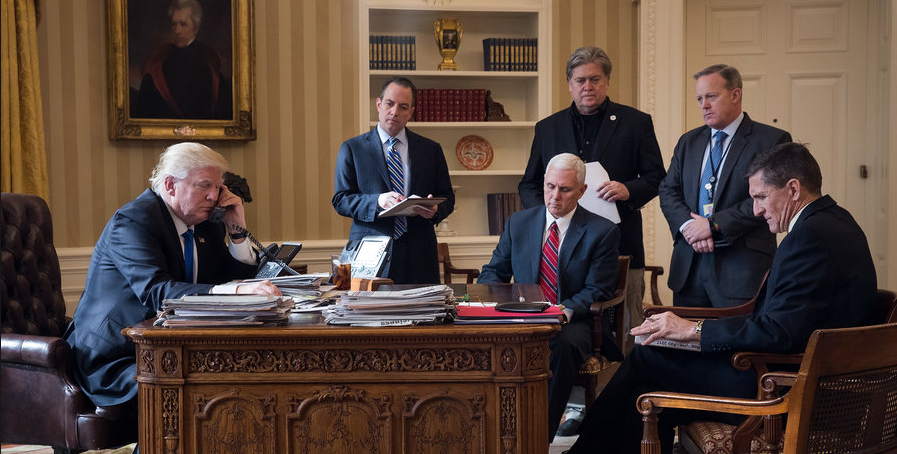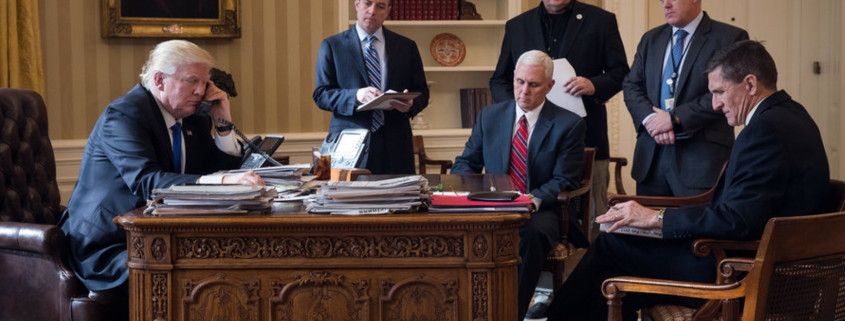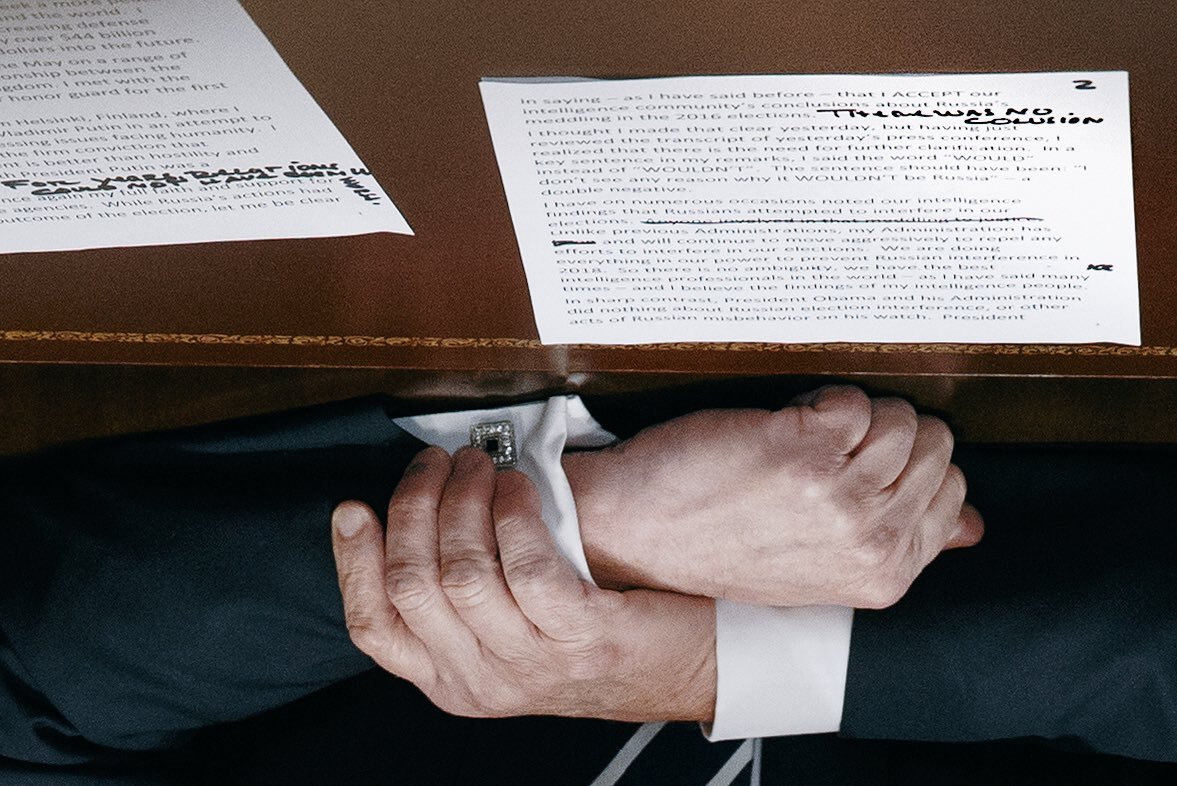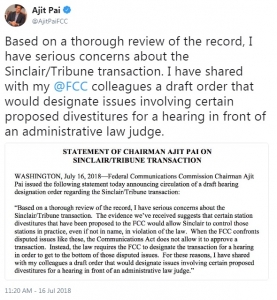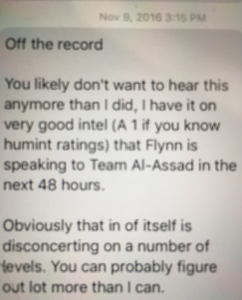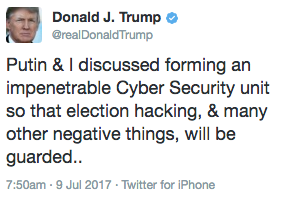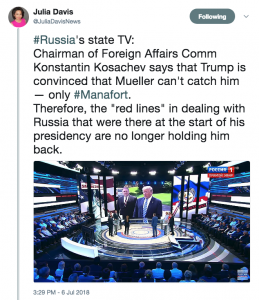Lawfare’s Theory of L’Affaire Russe Misses the Kompromat for the Pee Glee
As I disclosed last month, I provided information to the FBI on issues related to the Mueller investigation, so I’m going to include disclosure statements on Mueller investigation posts from here on out. I will include the disclosure whether or not the stuff I shared with the FBI pertains to the subject of the post.
Lawfare has updated a piece they did in May 2017, laying out what they believe are the seven theories of “L’Affaire Russe,” of which just five have withstood the test of time. It’s a worthwhile backbone for discussion among people trying to sort through the evidence.
Except I believe they get one thing badly wrong. Close to the end of the long post, they argue we’ve seen no evidence of a kompromat file — which they imagine might be the pee tape described in the probably disinformation-filled Steele dossier.
On the other hand, the hard evidence to support “Theory of the Case #6: Kompromat” has not materially changed in the last 15 months, though no evidence has emerged that undermines the theory either. No direct evidence has emerged that there exists a Russian kompromat file—let alone a pee tape—involving Trump, despite a huge amount of speculation on the subject. What has changed is that Trump’s behavior at the Helsinki summit suddenly moved the possibility of kompromat into the realm of respectable discourse.
Nevertheless, along the way, they point to evidence of direct ties between Trump’s behavior and Russian response.
The candidate, after all, did make numerous positive statements about Russian relations and Vladimir Putin himself—though how much of this has anything to do with these meetings is unclear. At a minimum, it is no small thing for the Russian state to have gotten a Republican nominee for president willing to reverse decades of Republican Russia-skepticism and commitment to NATO.
[snip]
What’s more, two days before the meeting, Trump promised a crowd that he would soon be giving a “major speech” on “all of the things that have taken place with the Clintons”—but after the meeting turned out to be a dud, the speech did not take place. And notably, the hacking indictment shows that the GRU made its first effort to break into Hillary Clinton’s personal email server and the email accounts of Clinton campaign staff on the same day—July 27, 2016—that Trump declared at a campaign stop, “Russia, if you’re listening, I hope you’re able to find the 30,000 emails that are missing” from Clinton’s email account.
For some reason, they describe Don Jr’s reported disappointment about the June 9 meeting, but not Ike Kaveladze’s testimony that his initial report to Aras Agalarov (the report made in front of witnesses) was positive. Based on Don Jr’s heavily massaged (and, public evidence makes clear, perjurious) testimony, they claim that the Trump Tower meeting was a dud. Then they go on to note that the Russians at the June 9 meeting asked for Magnitsky sanction relief, rather than offering dirt.
In June 2016, Donald Trump, Jr., Jared Kushner and Paul Manafort met with a group of Russian visitors in Trump Tower, including attorney Natalia Veselnitskaya. In the now-infamous email exchange that preceded the meeting, Trump, Jr. wrote, “I love it, especially later in the summer” when informed that the meeting would provide him with documents that “would incriminate Hillary and her dealings with Russia and would be very useful to your father.” Trump, Jr. and other representatives of the Trump campaign were reportedly disappointed when Veselnitskaya failed to provide the promised “dirt” on Clinton and discussed the issue of Russian adoptions under the Magnitsky Act instead.
[snip]
While there is evidence—most notably with respect to the Trump Tower meeting—of Trump campaign willingness to work with the Russians, there’s not a lot of evidence that any kind of deal was ever struck.
To sustain their case that “there’s not a lot of evidence that any kind of deal was ever struck,” they neglect a number of other points. They don’t mention, for example, that a week after the Trump Tower meeting, the Russians released the first of the stolen files. They don’t mention that (contrary to Don Jr’s massaged testimony and most public claims since) there was a significant effort in November 2016 to follow-up on that June 9 meeting. They don’t mention that that effort was stalled because of the difficulty of communicating given the scrutiny of being President-elect. They don’t mention that the same day the Agalarov people discussed the difficulty of communicating with the President-elect, Jared Kushner met the Russian Ambassador in Don Jr’s office (not in transition space) and raised the possibility of a back channel, a meeting which led to Jared’s meeting with the head of a sanctioned bank, which in turn led to a back channel meeting in the Seychelles with more sanctioned financiers. And inexplicably, they make no mention of the December 29, 2016 calls, during which — almost certainly on direct orders from Trump relayed by KT McFarland — Mike Flynn got the Russians to stall any response to Obama’s sanctions, a discussion Mike Flynn would later lie about to the FBI, in spite of the fact that at least six transition officials knew what he really said.
Why does Lawfare ignore the basis for the plea deal that turned Trump’s one-time National Security Advisor into state’s evidence, when laying out the evidence in this investigation?
All of which is to say that even with all the things Lawfare ignores in their summary, they nevertheless lay out the evidence that Trump and the Russians were engaged in a call-and-response, a call-and-response that appears in the Papadopoulos plea and (as Lawfare notes) the GRU indictment, one that ultimately did deal dirt and got at least efforts to undermine US sanctions (to say nothing of the Syria effort that Trump was implementing less than 14 hours after polls closed, an effort that has been a key part of both Jared Kushner and Mike Flynn’s claims about the Russian interactions).
At each stage of this romance with Russia, Russia got a Trump flunkie (first, Papadopoulos) or Trump himself to publicly engage in the call-and-response. All of that led up to the point where, on July 16, 2018, after Rod Rosenstein loaded Trump up with a carefully crafted indictment showing Putin that Mueller knew certain things that Trump wouldn’t fully understand, Trump came out of a meeting with Putin looking like he had been thoroughly owned and stood before the entire world and spoke from Putin’s script in defiance of what the US intelligence community has said.
People are looking in the entirely wrong place for the kompromat that Putin has on Trump, and missing all the evidence of it right in front of their faces.
Vladimir Putin obtained receipts at each stage of this romance of Trump’s willing engagement in a conspiracy with Russians for help getting elected. Putin knows what each of those receipts mean. Mueller has provided hints, most obviously in that GRU indictment, that he knows what some of them are.
For example, on or about July 27, 2016, the Conspirators attempted after hours to spearphish for the first time email accounts at a domain hosted by a third-party provider and used by Clinton’s personal office. At or around the same time, they also targeted seventy-six email addresses at the domain for the Clinton Campaign.
But Mueller’s not telling whether he has obtained the actual receipts.
And that’s the kompromat. Trump knows that if Mueller can present those receipts, he’s sunk, unless he so discredits the Mueller investigation before that time as to convince voters not to give Democrats a majority in Congress, and convince Congress not to oust him as the sell-out to the country those receipts show him to be. He also knows that, on the off-chance Mueller hasn’t figured this all out yet, Putin can at any time make those receipts plain. Therein lies Trump’s uncertainty: It’s not that he has any doubt what Putin has on him. It’s that he’s not sure which path before him — placating Putin, even if it provides more evidence he’s paying off his campaign debt, or trying to end the Mueller inquiry before repaying that campaign debt, at the risk of Putin losing patience with him — holds more risk.
Trump knows he’s screwed. He’s just not sure whether Putin or Mueller presents the bigger threat.

